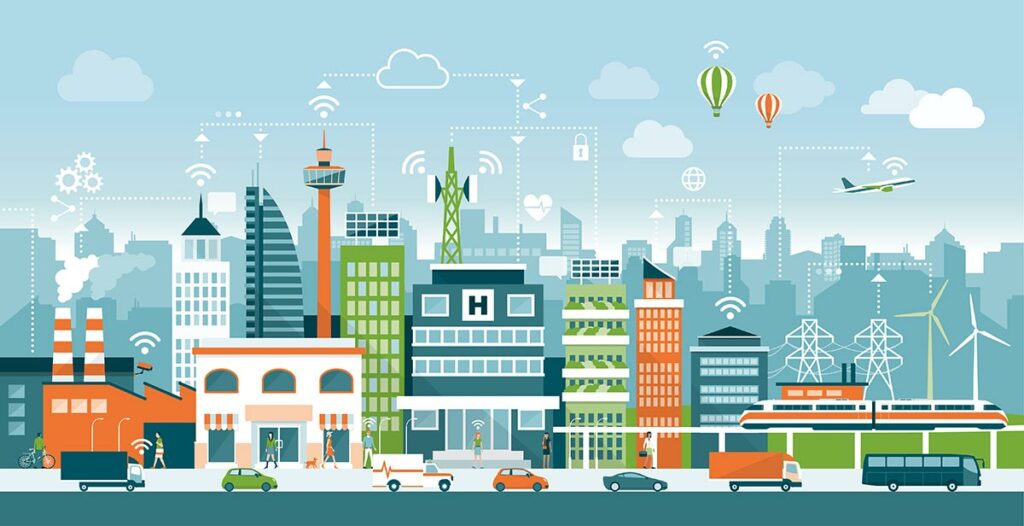As a commission advance specialist working with Realtors and with a keen interest in the intersection of technology and real estate, I’ve been closely observing the rise of smart cities. These aren’t just futuristic concepts from science fiction; they’re real, unfolding right now in our urban landscapes. The integration of Internet of Things (IoT) devices and big data analytics is dramatically transforming how cities operate and enhancing the quality of life for their residents.
What Makes a City “Smart”?
A smart city uses digital technology to connect, protect, and enhance the lives of its citizens. IoT and big data serve as the backbone of this transformation. IoT devices collect vast amounts of data from sensors embedded in city infrastructure—everything from traffic lights and water pipes to buses and CCTV cameras. This data is then analyzed to improve public transportation, reduce energy consumption, and enhance public safety, among other things.
For someone like me, who has always been fascinated by how data can inform better decisions, the potential of smart cities resonates deeply. It’s about using data not just for the sake of technology, but to make real, impactful changes that improve urban living.
Enhancing Urban Efficiency and Sustainability
One of the most exciting aspects of smart cities is their ability to enhance efficiency. Take traffic management, for example. By using data from traffic sensors and cameras, smart cities can optimize traffic flow, reducing congestion and minimizing emissions. This kind of data-driven management can transform what it means to commute in a city, making it faster and less frustrating.
Energy management is another area where smart cities are making significant strides. IoT devices can help monitor and manage energy usage more effectively, not just in public spaces but also in homes and businesses. This leads to substantial energy savings and, importantly, a lower carbon footprint. As cities continue to grow, managing our resources efficiently is becoming increasingly crucial.
Big Data: The Big Game Changer
Big data analytics plays a pivotal role in the operation of smart cities. With the ability to analyze huge sets of data, city administrators can identify patterns and trends that inform policy decisions. For instance, data on water usage can help detect leaks and conserve water, while data on public transportation usage can help in planning more effective routes.
From a real estate perspective, the implications are profound. Smart cities attract businesses and residents who value technology and sustainability, which can drive up property values and create new real estate ownership opportunities. It is thrilling to see how the areas we invest in can potentially transform into high-demand hotspots due to technological advancements.
Challenges on the Horizon
Despite the many benefits, the road to becoming a smart city is fraught with challenges. Privacy and security concerns top the list, as the increase in data collection can lead to vulnerabilities if not properly managed. Additionally, the financial cost of implementing smart technologies can be substantial, which means that careful planning and management are crucial.
Moreover, there is the challenge of ensuring these benefits are distributed equitably. Smart city technology must not only be reserved for high-income areas but should also help improve life in underprivileged communities. As someone who believes in the power of technology to make a difference, I see this as an essential focus for future smart city initiatives.
Looking Forward: The Future of Smart Cities
Looking ahead, the evolution of smart cities is likely only to accelerate. Advances in AI and machine learning will enhance the ability of cities to make sense of the data they collect, leading to even smarter solutions for urban problems. For those of us in the real estate and related sectors, this evolution presents both opportunities and challenges.
We must be ready to adapt to the changing landscape, ensuring we understand the technologies driving these changes and the impact they have on market dynamics. There’s a need for professionals in the industry to stay informed and agile, ready to leverage the possibilities that smart city developments bring.
As we advance, I remain optimistic about the potential of smart cities to redefine urban living. By harnessing the power of IoT and big data, we can create cities that are not only more efficient and sustainable but also more responsive to the needs of their residents. The journey to smarter cities is just beginning, and I am excited to see this transformation.
